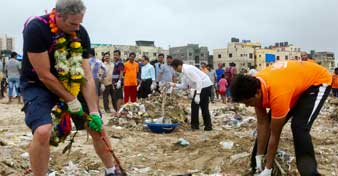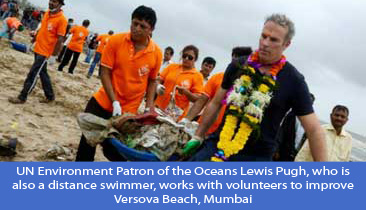Mumbai beach clean-up lays waste to 3 mn kg marine litter

In what has been touted as the largest beach clean-up in the world, on a beach in Mumbai, India, the quantity of rubbish removed over the last 45 weeks has reached 2.8 million kg. This story has a human touch to it as it all started with the efforts of two individuals: a lawyer in his thirties, Afroz Shah, and a retired businessman in his eighties, Harbanash Mathur. During a walk to the beach in October last year, they were horrified with what they saw: plastic bags, cement bags, glass bottles, pieces of clothing, shoes and other litter covered every inch of sand, turning the once-pristine coastline into a wasteland.
Undaunted by the herculean scale of the task, Shah and Mathur rolled up their shirt sleeves, walked down to the beach and began picking up trash. Thus, started what has since mushroomed into the world’s largest ever beach clean-up, joined by people of every age, shape, size and background: from a fisherman with partial paralysis and movie stars with the power to pull in volunteers, to young children. Mathur has since died, following a battle with cancer, but his legacy has continued to grow. The clean-up effort focuses on the 2.5-km Versova beach, in western Mumbai facing the Arabian Sea. Historically noted for its fishing culture, the area has more recently been in the limelight for its notoriously vast amounts of rubbish littering its shoreline.
United Nations Environment Programme (UNEP)’s Executive Director Erik Solheim says, “Back on that first day of the clean-up, nobody paid much attention to Afroz and Harbanash. They should have; it was every bit as important as the global agreements making headlines.”

Up to 13 million tonnes of plastic and other amounts of other rubbish end up in oceans every year, says UNEP. “One of the gravest threats to the health of our oceans comes from microplastics – tiny plastic beads found in personal care products or created through the breakdown of larger items. These insidious plastic granules, often invisible to the naked eye, are easily ingested by mussels, fish and other marine animals. On entering the food chain, they can pose major problems for the marine environment and, possibly, human health,” says UNEP.
A volunteer group has now been formed by Versova residents, totalling 500, who reportedly meet every weekend to undertake the cleaning. The volunteers have hauled and picked from the beach everything from condoms to sanitary pads, school bags to tobacco pouches. Most of the waste is made up of plastic bags and discarded pieces of clothing.
“It is the sheer quantity that is so disturbing: in some places it is shin deep,” said Shah. “But we treat all this litter as an opportunity: the beach acts as a net to catch the pollutants from the ocean. We grab this opportunity so that the plastic is not carried into the deep sea by ocean currents.”
UNEP says the littering problem is a sad reflection of a society's lack of understanding on the implication of their actions. “We are damaging our environment, our food chain and our health in ways that we have not even begun to understand. But each one of us has the power to turn that around. We can stop it at source, in our homes and on our beaches,” adds Solheim.
Shah says he also wants to clean-up the coastline’s litter-choked mangrove forests, which act as a vital natural defence against storm surges, and to inspire similar groups across India and the rest of the world to launch their own clean-up movements.
More recently, the clean-up has gotten the attention of the local Maharashtra Maritime Board (MMB), which will draft guidelines to ensure cleanliness and proper solid waste management.
“With MMB on board, the idea is to go directly to the source of the problem,” said Shah. He says what the volunteers are are doing is now is preventive action and with the state government’s support, they can expect to eradicate the problem faster.
With marine litter not only a big problem on land but in the sea, creating the Great Pacific Garbage Patch (a huge, swirling vortex of marine debris in the North Pacific Ocean), this effort by Mumbai residents is commendable. “Their efforts remind the rest of the world that even the most ambitious, global agreements are only as good as the individual action and determination,” said Solheim in a message to the Versova volunteers.
(PRA)Copyright (c) 2016 www.plasticsandrubberasia.com. All rights reserved.












































